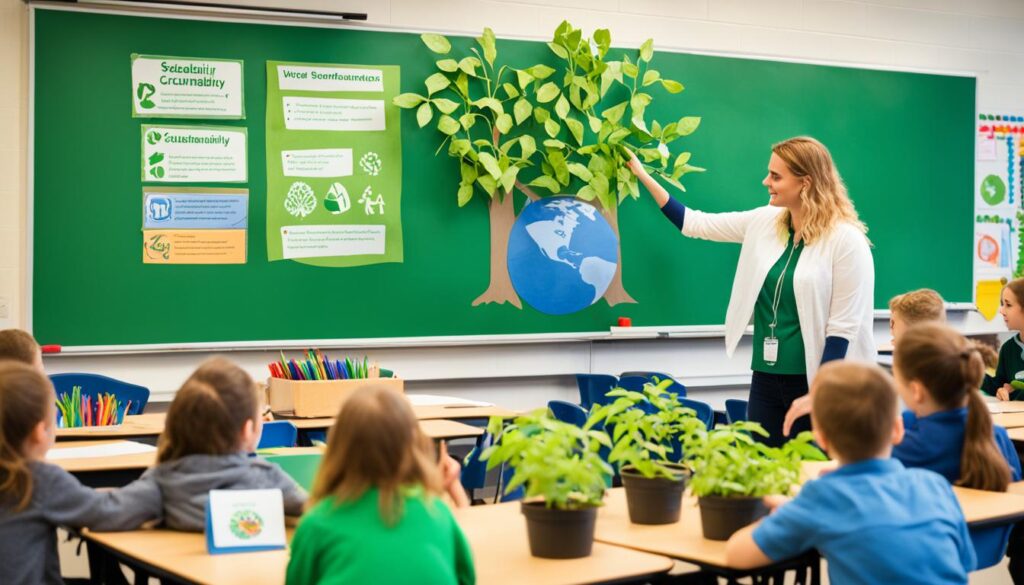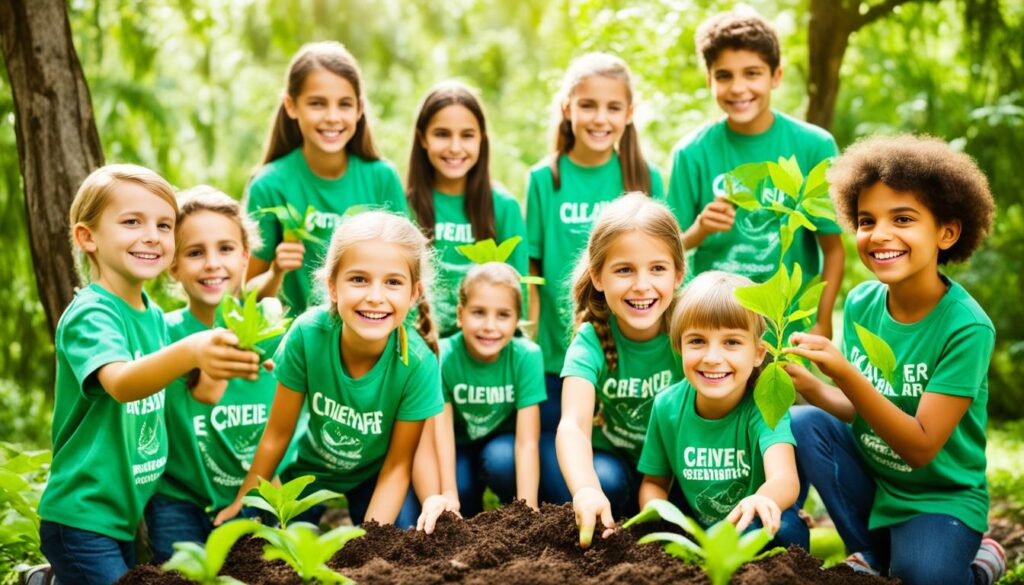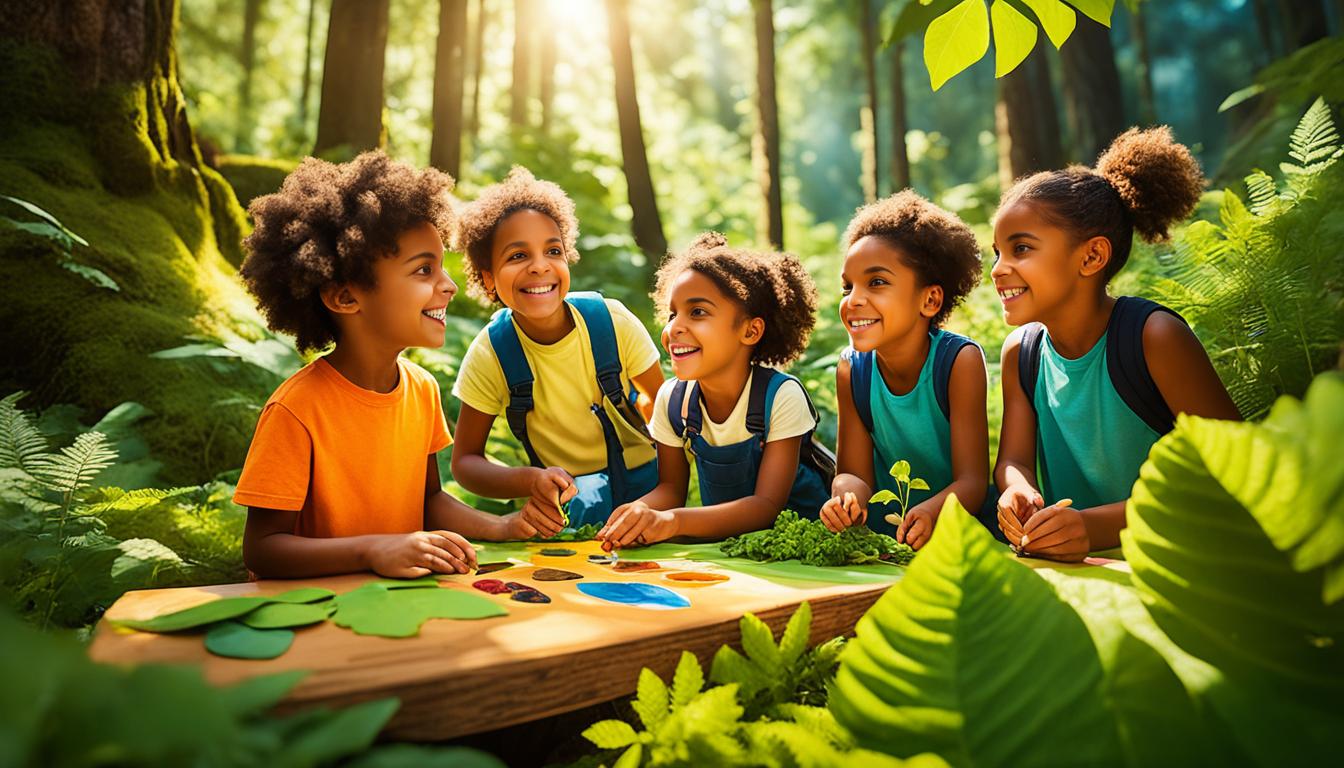Welcome to our blog on green education and its role in empowering future generations for a sustainable world! In today’s rapidly changing environment, it is essential to equip young people with the knowledge and skills needed to address the pressing environmental challenges we face. Green education plays a crucial role in fostering a sense of responsibility and creating a greener future.
By integrating sustainability into education systems, we can empower students to become active agents of change, driving innovation and sustainable practices in all aspects of their lives. Let’s explore the aspirations of Gen Z and Gen Alpha for green education, innovative green education programs, the importance of environmental awareness education, and much more. Join us as we delve into the fascinating world of green education!
Key Takeaways:
- Green education is essential for empowering future generations to create a sustainable world.
- By equipping young people with the knowledge and skills needed to address environmental challenges, we can foster a sense of responsibility and create a greener future.
- Gen Z and Gen Alpha have increasing aspirations for green education and are more educated about sustainability than any previous generation.
- Environmental awareness education is crucial in shaping the mindset of individuals towards environmental issues.
- A sustainable curriculum should be developed to integrate eco-friendly learning into schools.
Unpacking the Aspirations of Gen Z and Gen Alpha for Green Education
Gen Z and Gen Alpha, the generations that follow Millennials, have shown a remarkable interest and enthusiasm for green education. These young individuals are more educated about sustainability and environmental issues than any previous generation, understanding the urgent need to address the challenges faced by our planet. As we strive towards a greener future, it is crucial to unpack their aspirations and develop innovative green education programs that cater to their unique needs and interests.
Innovative Green Education Programs
Green education programs must evolve to meet the aspirations of Gen Z and Gen Alpha. These programs need to be creative, engaging, and interactive, leveraging technology and modern teaching methods to captivate the attention of the younger generation. By incorporating elements such as gamification, virtual reality, and real-world case studies, these programs can provide a comprehensive understanding of environmental issues and inspire active participation in sustainable practices.
Environmental Literacy and Global Awareness
Environmental literacy and global awareness are vital components of green education for Gen Z and Gen Alpha. These future leaders need to develop a deep understanding of the interconnectedness of environmental issues and their global impact. By learning about sustainable development, climate change, biodiversity conservation, and other key areas, they can cultivate a sense of responsibility towards the environment and become advocates for positive change.
Global awareness should extend beyond theoretical knowledge, encouraging active engagement and participation in global initiatives. This can be achieved through partnerships with international organizations, exchange programs, and collaborative projects that foster cross-cultural learning and empower young individuals to make a difference on a global scale.
Redefining School Curricula with Sustainability Education
School curricula are a fundamental component of education, shaping the knowledge and skills that students acquire. To prepare future generations for a sustainable future, it is crucial to redefine school curricula to incorporate sustainability education. By integrating concepts of sustainability across different subjects, schools can provide students with a holistic understanding of environmental issues and empower them to make sustainable choices.

Integrating sustainability education into school curricula offers several benefits. It helps students develop a sense of environmental responsibility and fosters a deep appreciation for the natural world. By exploring topics such as climate change, biodiversity, and resource conservation, students gain the knowledge and skills needed to address pressing environmental challenges.
Moreover, sustainability education encourages critical thinking and problem-solving skills. By examining real-world examples of sustainability practices and discussing potential solutions, students develop the ability to analyze complex environmental issues and propose innovative ideas.
Sustainability education can be seamlessly integrated into various subjects, such as science, geography, and social studies. For example, a science lesson on renewable energy could explore the benefits of solar and wind power, while a geography class might examine the impacts of deforestation on local ecosystems. By incorporating sustainability across the curriculum, students receive a well-rounded education that prepares them to become informed and responsible global citizens.
By redefining school curricula with sustainability education, we can empower students to become active agents of change. As they progress through their education and enter the workforce, these students will have the knowledge and skills needed to contribute to a sustainable future. It is through their collective efforts that we can create a greener, more environmentally conscious society.
The Importance of Environmental Awareness Education
Environmental awareness education plays a crucial role in shaping the mindset of individuals towards environmental issues. By increasing awareness and understanding of the impact of human actions on the environment, individuals can make informed decisions and actively contribute to environmental conservation.
When individuals are educated about the importance of environmental awareness, they become more conscious of their own behaviors and the choices they make. They develop a deeper understanding of how their actions can either contribute to or mitigate environmental challenges. This education empowers individuals to take responsibility for their own impact on the environment and make sustainable choices in their daily lives.
Through environmental awareness education, individuals gain valuable knowledge about the fragility of ecosystems, the depletion of natural resources, and the consequences of pollution and climate change. This knowledge helps them develop a sense of urgency and responsibility to protect and preserve the planet for future generations. It also instills a sense of empathy and respect for nature, fostering a deeper connection to the environment.
Environmental awareness education is particularly important for younger generations. By starting environmental education at a young age, children can develop a lifelong appreciation for the environment and a strong foundation of environmental literacy. This education equips them with the knowledge and skills needed to become environmentally conscious citizens and advocates for sustainable practices.
Overall, environmental awareness education is essential for cultivating a society that values and prioritizes sustainability. By raising awareness and understanding of environmental issues, this education empowers individuals to make positive changes in their own lives and contribute to broader environmental initiatives. Through increased environmental awareness, we can work towards a greener and more sustainable future.
Sustainable Curriculum: Integrating Eco-Friendly Learning Into Schools
A sustainable curriculum is essential for integrating eco-friendly learning into schools, nurturing future generations to become stewards of our planet. By incorporating environmental concepts and practices into educational programs, students can develop a deep understanding of sustainability and its significance in their daily lives.
Climate Change Curriculum: Preparing Students for Tomorrow
Implementing a climate change curriculum equips students with the knowledge and skills necessary to tackle the environmental challenges of tomorrow. By exploring topics such as the causes and consequences of climate change, renewable energy, and sustainable solutions, students gain a comprehensive understanding of the urgent need for action and their role in mitigating climate change.
Biodiversity Education: The Role of Nature Conservation in Learning
Biodiversity education plays a crucial role in fostering an appreciation for the natural world and the importance of nature conservation. Students learn about the rich variety of life on Earth, the interconnectedness of ecosystems, and the impact of human activities on biodiversity. Through hands-on experiences and immersive learning opportunities, they develop a deep sense of responsibility towards protecting and preserving our planet’s precious ecosystems.
The Intersection of Technology, Media, and Green Education
Technology and media play a significant role in shaping and enhancing green education. By leveraging these tools, we can empower youth to become active participants in creating a sustainable future.
Empowering Youth through Media and Information Literacy (MIL)
Media and information literacy (MIL) is vital in today’s digital age. It equips young individuals with the skills and knowledge necessary to critically engage with media content and make informed decisions. MIL empowers them to distinguish between reliable sources of information and misleading content.
Educating youth about media literacy also enables them to understand the role of media in shaping public opinion and influencing behaviors. By developing MIL skills, young people can navigate the media landscape with confidence and discernment, making them effective advocates for environmental causes.

Utilizing Digital Platforms for Environmental Education Resources
Digital platforms offer unparalleled opportunities for accessing and disseminating environmental education resources. Online platforms provide easy and convenient access to a wealth of valuable information and educational materials.
Through digital platforms, youth can explore various aspects of environmental education, such as biodiversity, climate change, and sustainable practices. These platforms offer interactive learning experiences, engaging multimedia content, and virtual simulations, making environmental education more engaging and accessible.
By utilizing digital platforms, educators and organizations can reach a broader audience and create a global community dedicated to green education. These platforms foster collaboration, knowledge sharing, and the exchange of innovative ideas, accelerating our collective efforts to create a sustainable future.
Comparison of Digital Platforms for Environmental Education Resources
| Platform | Features |
|---|---|
| Platform A | Interactive modules, quizzes, and games |
| Platform B | Virtual field trips and immersive experiences |
| Platform C | Live webinars and expert-led discussions |
| Platform D | Crowdsourced projects and citizen science initiatives |
| Platform E | Curated resources and teacher support materials |
Table: Comparison of digital platforms for environmental education resources.
These digital platforms offer diverse features tailored to meet the unique learning needs and preferences of youth. By harnessing these platforms, we can cultivate a generation of environmentally conscious individuals equipped with the knowledge and skills needed to address pressing environmental challenges.
Cultivating Environmental Care in the Eco-Conscious Classroom
In the eco-conscious classroom, cultivating environmental care is a fundamental aspect of creating a sustainable learning environment. By implementing eco-friendly initiatives, raising awareness about environmental issues, and integrating environmental topics into the curriculum, educators can foster a sense of responsibility and instill eco-conscious values in students.
One of the key initiatives in the eco-conscious classroom is the implementation of recycling programs. Encourage students to actively participate in recycling efforts by providing designated bins for different types of waste and organizing educational activities that highlight the importance of recycling for preserving the environment. By involving students in these efforts, they develop a sense of ownership and understand the positive impact their actions can have on the planet.
Another important aspect of environmental care in the classroom is promoting energy-saving practices. Educators can engage students in discussions about energy conservation and demonstrate practical ways to reduce energy consumption. Encourage students to turn off lights and electronics when not in use, and educate them about the benefits of using energy-efficient appliances. By demonstrating these practices in the classroom, students learn to implement them in their daily lives, contributing to a greener future.
Integrating environmental topics into the curriculum is also crucial for cultivating environmental care. Incorporate lessons that explore topics such as climate change, biodiversity, and sustainable development. These topics can be integrated into various subjects, including science, geography, and even art. By incorporating environmental discussions and projects into different areas of study, students gain a holistic understanding of environmental issues and develop a deeper appreciation for nature.
Image:

Creating an eco-conscious classroom not only promotes environmental care but also empowers students to become responsible global citizens. Through sustainable practices and engaging curriculum, educators can inspire a new generation that is passionate about environmental conservation and equipped to make positive changes in the world.
Paving the Way for Sustainable Living Through Education
Education plays a pivotal role in paving the way for sustainable living. By imparting knowledge and instilling eco-consciousness in students, we can empower them to make sustainable choices and contribute to a greener future.
Incorporating Eco-Consciousness Programs into Daily Learning
One effective way to promote sustainable living is by incorporating eco-consciousness programs into daily learning. These programs can be designed to raise awareness about environmental issues, provide practical solutions, and encourage students to adopt eco-friendly habits.
Through interactive activities, workshops, and projects, students can develop a deep understanding of sustainable practices and their impact on the environment. By integrating these programs into the curriculum, educational institutions can create a supportive and engaging learning environment that fosters eco-consciousness.
Promoting Eco-Friendly Practices for a Greener Tomorrow
In addition to incorporating eco-consciousness programs, it is essential to promote eco-friendly practices both within and outside the classroom. By adopting sustainable habits, students can actively contribute to a greener tomorrow.
Simple practices such as reducing waste, recycling, conserving energy, and using eco-friendly products can make a significant difference in reducing our carbon footprint. By introducing and reinforcing these practices within the educational setting, students are encouraged to make sustainable choices that extend beyond their school lives into their everyday lives.
Furthermore, educational institutions can collaborate with local communities to organize initiatives that promote sustainable living. These initiatives can include community clean-up drives, tree planting activities, and awareness campaigns to spread the message of eco-friendly practices.
By instilling eco-consciousness and promoting eco-friendly practices, education plays a vital role in shaping the mindset and behaviors of future generations, paving the way for a sustainable and environmentally conscious society.
Celebrating International Youth Day: Educating for a Greener Future
International Youth Day serves as a reminder of the valuable contributions made by young individuals and their potential to shape a more sustainable world. As we celebrate this occasion, it is crucial to recognize the role of education in preparing the youth for a greener future.
Green Skills for a Sustainable Economy
To build a sustainable economy, it is essential to equip young people with green skills that enable them to address environmental challenges effectively. Green skills encompass a wide range of knowledge and abilities, including sustainable resource management, renewable energy development, waste reduction, and environmental conservation. By nurturing these skills, we empower future generations to become eco-conscious leaders in various industries.
Building a Greener and More Sustainable Economy
A greener and more sustainable economy goes beyond the integration of green skills. It entails developing environmentally-friendly policies, promoting sustainable practices in businesses, fostering innovation in sustainable technologies, and creating a circular economy that minimizes resource consumption and waste generation. By embracing these principles, we can establish an economy that thrives while safeguarding the health of our planet.
Forming Collaborative Partnerships for Impactful Green Initiatives
Collaborative partnerships play a critical role in driving impactful green initiatives. By bringing together businesses, communities, and global stakeholders, we can create a collective force for positive environmental change. Through these collaborations, we can leverage the resources, expertise, and influence of various stakeholders to foster a more sustainable future.
Business and Community Engagement in Sustainability Education
Engaging businesses and communities in sustainability education is essential for creating a lasting impact. Businesses can contribute by incorporating sustainability principles into their operations and promoting eco-friendly practices. They can also provide funding, mentorship, and internship opportunities to support green education initiatives. Similarly, community engagement is crucial for raising awareness and inspiring individual action. By involving local communities, we can empower them to be active participants in environmental conservation efforts and sustainable practices.
Global Cooperation for Enhanced Environmental Learning
To effectively address environmental challenges, global cooperation is key. By fostering collaboration and knowledge sharing across borders, we can enhance environmental learning on a global scale. International partnerships can facilitate the exchange of best practices, innovation, and research, enabling us to develop effective strategies to combat climate change and promote sustainable development worldwide. By embracing global cooperation, we can create a more interconnected and informed community dedicated to environmental stewardship.
| Benefits of Collaborative Partnerships in Green Initiatives | Examples |
|---|---|
| Access to diverse resources and expertise | Partnering with renewable energy companies to implement sustainable energy solutions in communities |
| Increased funding opportunities | Collaborating with corporate sponsors to support green education programs in schools |
| Broader reach and impact | Working with community organizations to organize clean-up campaigns in local parks and beaches |
| Knowledge exchange and innovation | Collaborating with international research institutions to develop cutting-edge solutions for environmental challenges |
| Collective advocacy for policy change | Partnering with environmental NGOs to lobby for stricter regulations on carbon emissions |
Forming collaborative partnerships is a powerful way to harness the collective efforts of businesses, communities, and global stakeholders in driving green initiatives. By working together, we can create a sustainable future for generations to come.
Conclusion
Green education is the key to empowering future generations and creating a sustainable future. By integrating sustainability into education systems, we can equip young minds with the knowledge and skills needed to address environmental challenges. This will foster a sense of responsibility and cultivate a greener world for generations to come.
To achieve this, it is essential to foster environmental awareness among students. By teaching them about the impact of human actions on the environment, we can instill a deeper understanding of the importance of conservation and inspire them to make informed choices.
Furthermore, engaging with technology and media is crucial in today’s digital age. By leveraging media platforms and providing accessible educational resources, we can ensure that students have easy access to information about sustainable practices and environmental issues.
In conclusion, by prioritizing green education, integrating sustainability into curricula, raising environmental awareness, and utilizing technology and media, we can collectively work towards a greener and more sustainable future. Let us embrace the power of education to shape a better world for ourselves and future generations.
FAQ
Why is green education important?
Green education is crucial for empowering future generations to create a sustainable world. It equips young people with the knowledge and skills needed to address environmental challenges and fosters a sense of responsibility.
What are the aspirations of Gen Z and Gen Alpha for green education?
Gen Z and Gen Alpha have growing aspirations for green education. They are more educated about sustainability and environmental issues than any previous generation. They aspire to be active agents of change and seek innovative green education programs that enhance environmental literacy and promote global awareness.
How can school curricula be redefined with sustainability education?
School curricula can be redefined by integrating concepts of sustainability across different subjects. By doing so, students can develop a holistic understanding of environmental issues and learn to incorporate sustainable practices into their daily lives.
Why is environmental awareness education crucial?
Environmental awareness education plays a pivotal role in shaping the mindset of individuals towards environmental issues. By increasing awareness and understanding of the impact of human actions on the environment, individuals can make informed decisions and actively contribute to environmental conservation.
How can a sustainable curriculum be developed to integrate eco-friendly learning into schools?
A sustainable curriculum can be developed by implementing a climate change curriculum that prepares students for the challenges of tomorrow. Additionally, biodiversity education plays a vital role in teaching students about the importance of nature conservation and its role in maintaining a sustainable planet. This ensures eco-friendly learning is integrated into schools.
What is the role of technology and media in green education?
Technology and media have a significant impact on green education. Empowering youth through media and information literacy equips them with the skills to critically engage with media content and develop green skills. Utilizing digital platforms for environmental education resources provides easy access to valuable information and educational materials.
How can environmental care be cultivated in the eco-conscious classroom?
Environmental care can be cultivated in the eco-conscious classroom by creating a learning environment that promotes sustainable practices and raises awareness about environmental issues. This includes implementing eco-friendly initiatives, such as recycling programs and energy-saving practices, and integrating environmental topics into the curriculum.
How does education pave the way for sustainable living?
Education plays a pivotal role in paving the way for sustainable living. By incorporating eco-consciousness programs into daily learning, students develop the knowledge and mindset needed to make sustainable choices. Promoting eco-friendly practices both within and outside the classroom creates a pathway towards a greener and more sustainable future.
How does celebrating International Youth Day contribute to green education?
International Youth Day is an occasion to celebrate the contributions of young individuals and recognize their potential to create a more sustainable world. Educating for a greener future involves equipping youth with green skills that are essential for building a sustainable economy. By fostering a greener and more sustainable economy, future generations can thrive and effectively address environmental challenges.
Why is forming collaborative partnerships important for green initiatives?
Forming collaborative partnerships is crucial for impactful green initiatives. By engaging businesses and communities in sustainability education, we can leverage their resources and expertise to create a more sustainable future. Additionally, global cooperation plays a vital role in enhancing environmental learning and addressing environmental issues on a larger scale.
How does green education contribute to a sustainable future?
Green education is vital for empowering future generations to create a sustainable future. By integrating sustainability into education systems, fostering environmental awareness, and engaging with technology and media, we can collectively work towards a greener and more sustainable world.
Source Links
- https://www.ey.com/en_uk/corporate-responsibility/empowering-next-generations-for-a-sustainable-future
- https://www.linkedin.com/pulse/empowering-next-generation-power-sustainability-education-rahul-kumar
- https://www.unesco.org/en/articles/empowering-youth-sustainable-development

